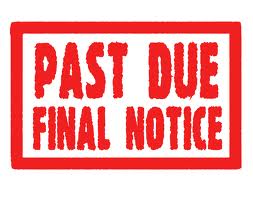 Many consumers are not aware of their rights when dealing with collection agencies. When it comes to battling a collection account, you actually have a little more power.
Many consumers are not aware of their rights when dealing with collection agencies. When it comes to battling a collection account, you actually have a little more power.
Collection agencies must comply with the Fair Debt Collections Practices Act (FDCPA) and under the FDCPA the consumer is protected from unfair practices and abuse.
Deleting a collection account from your credit reports will give your credit score a big boost. Find out what you should know before disputing collection accounts:
Consider Not Paying an Older Collection Account
Credit scoring weighs recent activity more heavily than older activity. Paying a collection account updates the date of last activity. In terms of credit scoring, a paid collection account is no better than an unpaid collection account. It is still a negative trade-line on your credit reports.
The older the negative entry, the less it affects your credit score. A newer negative entry will harm your credit score tremendously, paid or unpaid. If the account is older than 12 months, leave it alone, unless you negotiate a pay for deletion with the collection agency or dispute it with the collection agency or credit reporting agency and get the entire listing deleted.
Additionally, make sure you do not have more than one collection agency reporting on your credit reports for the same debt. If so, dispute for duplicate accounts and ask for a deletion of both accounts. You never know, they may just delete both of them.
Know the Statute of Limitations
Be mindful of the statute of limitations of the collection account you are disputing. If the debt is within the statute of limitations and it is properly validated, you could be sued. Should you be sued by a collection agency NEVER IGNORE THE LAWSUIT. Debt collectors are counting on you not filing an answer to a lawsuit and getting a default judgment against you.
Even if you currently have a default judgment against you, if you can prove you were not properly served with the lawsuit it is possible to get the judgment vacated. Seek a consumer law attorney. Naca.net has a listing of consumer law attorneys in each state, specializing in Fair Debt Collection Practices Act (FDCPA).
If you are within the Fair Credit Reporting Act 7-year statute of limitations of an account it may be wise to let the collection account drop off automatically. Collection account listings on your credit reports must be deleted when the 7-year FCRA statute of limitations expires. Request the credit reporting agency delete items reporting on your account past the 7 year reporting period.
Disputing Old Collection Items May Lower Your Score
Credit disputes are a vital aspect of fixing your credit but it may also hurt your credit score. When you dispute a collection and it is verified, the credit bureaus may update the date of last activity which makes the collection item look recent. It’s a tough decision to make. Sometimes you have to “let sleeping dogs lie” because older negative items affect credit scores a lot less than newer negative items. In fact, once a negative item is 4 years or older, it is no longer being calculated in your credit score.
If you choose to dispute a negative item absolutely go for a deletion of the entire item. Dispute factual errors within a collection account listing. You can get a few tips on how to dispute a collection account or have a professional help you dispute collection accounts. Lexington Law can assist. They helped clients remove 4,833,329 negative items in 2013 alone. Those negative credit items included: Bankruptcies, Foreclosures, Tax Liens, Repossessions, Judgments, Collections, Late revolving credit payments, and Inquiries.















